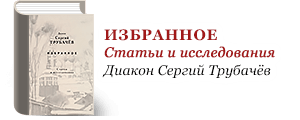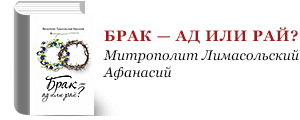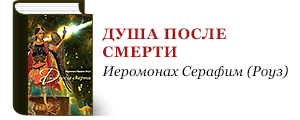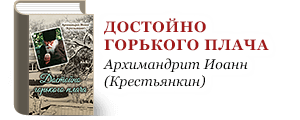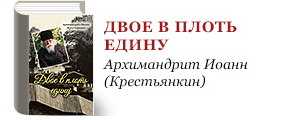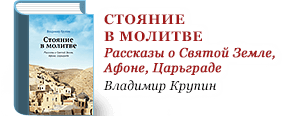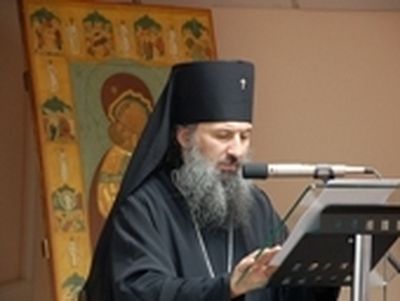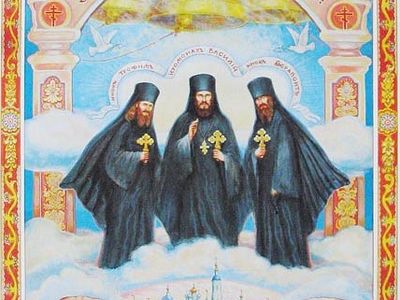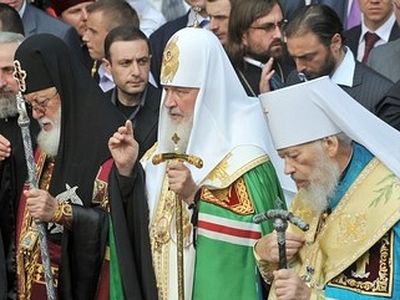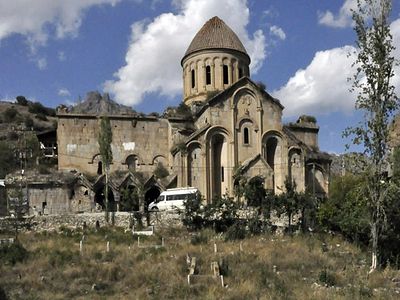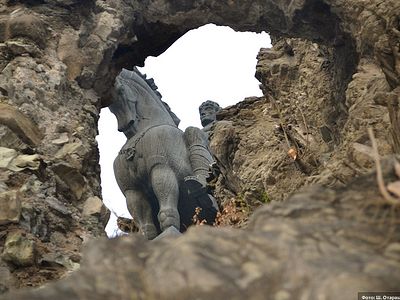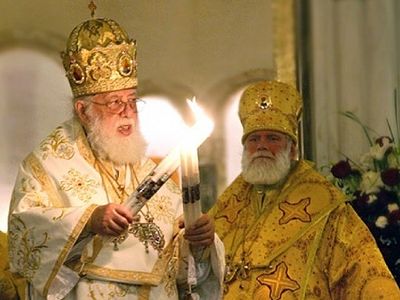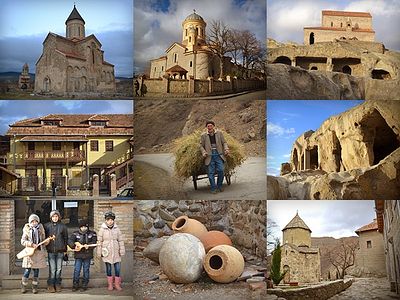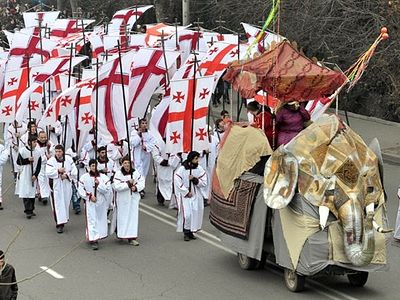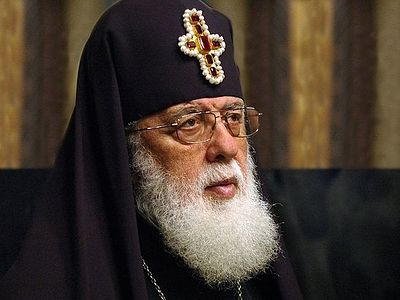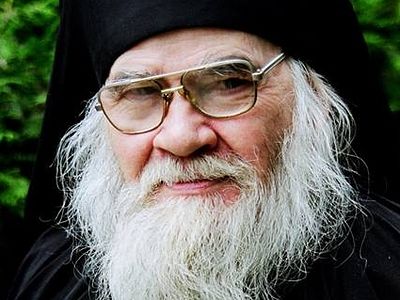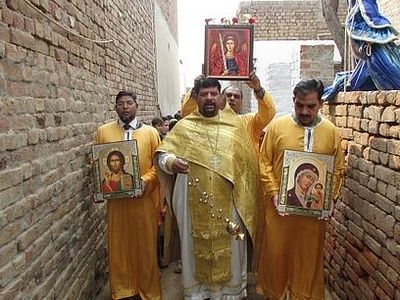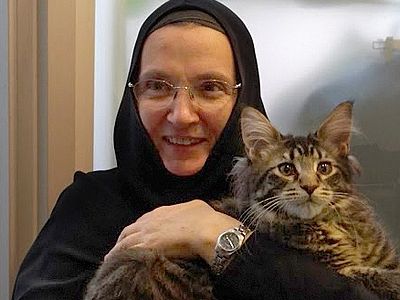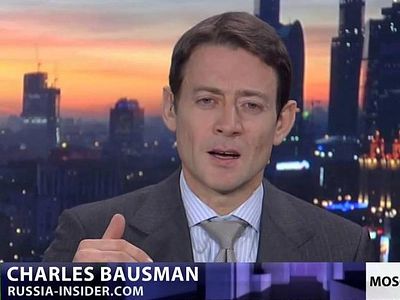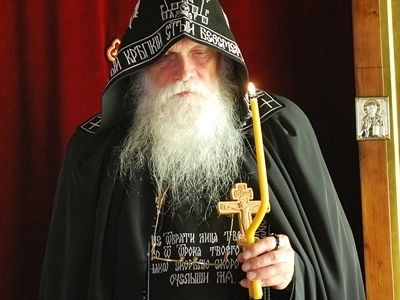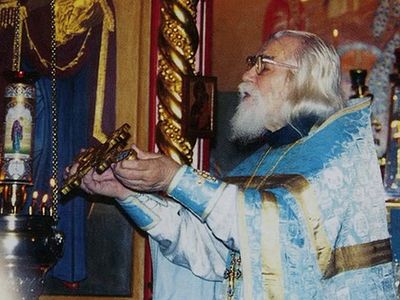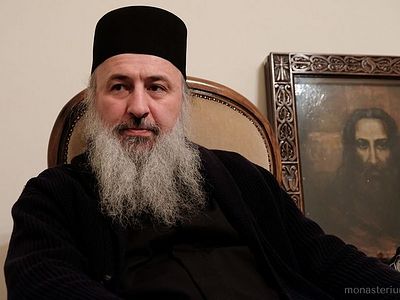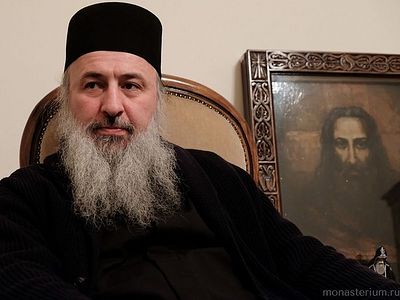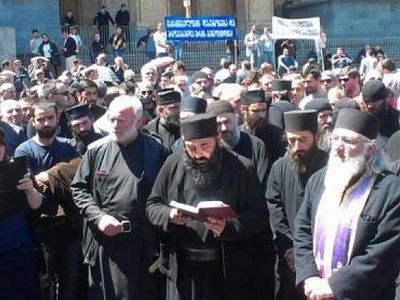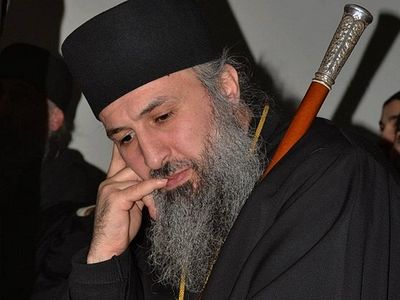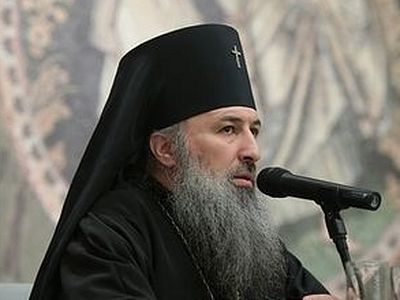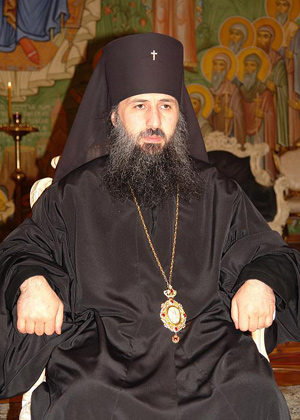
– God bless you. There were always believers in my family. My mother was a believer also. I cannot say that she was very church-going, because that brought many problems in those days, as everyone knows. She worked as the director of a department, and it was even dangerous to demonstrate one’s faith in such a position. But we always had icons at home, and a crucifix. We always celebrated Christmas and Pascha. Mama observed the fasts, especially the Nativity fast and Great Lent. She also went to church, and would often take me along. These visits to Church remain very strong in my memory. I especially remember our church in Sukhumi. Perhaps many do not know that St. John Chrysostom reposed in Abkhazia. His sarcophagus used to be in the Sukhumi Cathedral, in the right side-church. His image was there, embroidered with light blue and white beadwork. I always loved to go to that sarcophagus when I was little, and for some reason I always had the perception that the Lord lay in that sarcophagus. There was also a crucifix there. These are two details I recall about our Sukhumi Cathedral.
New Athos Monastery[1] was not functioning then. It was a tourist attraction, and a sanatorium.
– What years were those, Vladyka?
– This was in the mid 1970’s.
My coming into the Church was also connected with my relatives, in part with my brother’s wife, thanks to whom we entered more deeply into Orthodoxy and Church life. In the 1980’s (when the Soviet Union had not yet broken up), the spirit of freedom was spreading everywhere, and many religious movements were springing up in Sukhumi: “Hare Krishnas” were on the streets together with Baptists, Jehovah’s Witnesses, Seventh-day Adventists, and other sectarians. A large amount of literature came out. There was a periodical called Science and Religion, where you could find many articles of religious content. They wrote about everything, from Seventh Day Adventists to Confucianism and Reorich.[2] Everything was there. This was a very interesting time, because it was a time of searching. In those days, I had contact with the Hare Krishnas and the Baptists. After all this, when I came to the Church, I felt that I had come home.
– Where you born in Sukhumi?
– Yes, I was born and raised in Sukhumi. I went to school there, and started going to church there also—to the Sukhumi Cathedral of the Annunciation.
– How did Sukhumi look in those days? What was special about the city?
– In those days, Sukhumi was the pearl of the Black Sea. It was a multi-national city. I remember that my childhood friends included Georgians, Armenians, Russians, Germans, Jews, and Abkhazis. There was no discrimination between nationalities or religious affiliations. Perhaps we were too young to understand these differences, but neither did we ever hear from the adults, “don’t be friends with him, because he is of a different nationality.” That never happened. As I said, my friends were of all nationalities. We lived together, and shared every day.
Sukhumi was a very beautiful, open-hearted, kind and intellectual city. There were very many interesting, creative people there. I don’t even remember any questions arising about nationality or chauvinism. Of course, there were boyish fights and arguments, but there is nothing unusual in that, and every boy goes through such things as he grows up. Mainly we had very good relationships, upright and honest. This was characteristic of our Sukhumi.
– Vladyka, tell us about your student years. What teachers do you remember? Who influenced you?
– I do not have a classic spiritual education. I studied in secular institutions, both civilian and military, for example, in the Higher Military Aviation and Engineering School of Kharkov. After that I continued my studies in the State Institute of Subtropical Agriculture in Sukhumi. The people, the teachers whom I remember were always honest people who loved and helped their students.
I always recall with great love and kindness my course superintendent, Colonel Altunin. He was a very kind, good, and fair man, who always treated us with patience and respect—Georgians, Armenians, Azerbaijanis... We could always tell that he was aware of our national traditions and respected them, taking a special approach to our problems. I remember the young officers of the course. There was Lieutenant Kolesnikov, who was also from Abkhazia. The rector of the Institute of Subtropical Agriculture, Napoleon Karshadze, was a very worthy man, and respected by all the students. These people were examples to us of human dignity and professional knowledge.
In general, I consider that one should learn all his life, until death itself. A person studies all his life; in any case, he should study, and try to achieve something.
– When you graduated from the Institute, the war broke out. What do you remember about those times? What was happening in Sukhumi?
– I could not understand what was happening in our city. I have said many times that, unfortunately, we allowed it to happen. I am referring to us, the people who lived in that city, who were friends and relatives of each other. We allowed it to happen. Perhaps out of our inexperience, or someone else’s provocation, or just out of ignorance. What happened was very painful, very tragic for all—for Georgians and Abkhazis alike, as well as for all the other inhabitants of our city.
For example, there was this incident. One day, an Abkhazi named Gvazava died, and a Georgian named Gvazava also died. They had the same surname. But they were on opposite sides, and unfortunately, became enemies.
There was the bombing of the city, there were victims, fires. The inhabitants of Sukhumi left their family homes, walking through Svanetia, and very many of them froze to death in the mountains.
It is hard to speak about the causes of this war. But I always say that each of us must take responsibility for it. Each side should take part of the responsibility, and not be afraid of this responsibility, telling the truth about everything. I believe that both Georgians and Abkhazis will come to an agreement. We need to talk about it, admit our mistakes, and try to find some common language. That is, of course, if we want this, if we want to live like Christians, peacefully.
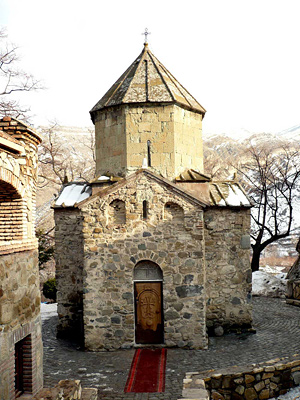 Ateni women monastery.
Ateni women monastery.
– In those days, there were not enough staple goods. But Services in the Church did not cease during the war, they went on the whole time. The Church did very much for its parishioners, and not only for them, but for all those who suffered during the war. People who did not have enough staple items, who were left without protection, received help from the Church. The Church always tried to take care of them. This all happened by the blessing and personal example of Archbishop Daniel of Sukhumi and Abkhazi (now Metropolitan), and of course, by the blessing of His Holiness Patriarch Ilya, who had been the Metropolitan of Sukhumi for eleven years—it was during his time on the Sukhumi-Abkhazi cathedra that he was elected Patriarch.
The parishes in Abkhazi were multi-national; there were Greeks, Georgians, Armenians, Russians, and Abkhazis. Even during the war, the question never arose as to someone’s nationality being the wrong one, or some one being an outsider. Everyone felt part of one family, all felt the Church’s care.
– Vladyka, how did you come to thoughts about monasticism?
– There have been many priests in our family, monks also. In Sukhumi served Archpriest Mikhail Gvazava and his brother Dimitry, and among the last Georgian monks of Mt. Athos were Matthew and Athanasius Gvazava, who were excellent psalmists. They preserved the ancient Georgian manuscripts and icons, which were later given over to the holy hieromartyr, Archimandrite Grigol (Paradze). There were other clergymen amongst our ancestors.
I had this strange thought in my childhood—when people would ask me, “What do you want to be when you grow up?” I would reply that I wanted either to be a general, or bishop. Later, when I came to the Church and made my first steps in it, I was still young, only twenty-one or twenty-two. This was in Sukhumi. For me, this was the achievement of something new: to me was opened a depth of knowledge and love. The main thing was what I felt, and what brought me to the Church—it was love and a depth of knowledge, which fills a person. It was the possibility to attain knowledge.
I never had the desire to become a priest. For some reason, I always wanted to live in solitude, in a small skete, with a few brothers, and that it be possible to serve the Liturgy. This was how I imagined my monastic life to be. I came to the decision to leave for a monastery after a number of years. It occurred as a gradual estrangement from the world and worldly cares. I had the happiness of meeting many interesting people along my life’s path, who greatly influenced my spiritual growth through their counsel and their letters... It was simply God’s mercy that I met them.
– Which of them is particularly dear to you?
– I will name first of all my first spiritual father—Archpriest Joseph Severin from Sukhumi. When I came to Batiushka he was eighty years old. He was a very wise, modest, and spiritual instructor. He never demanded anything of one, but rather evoked a feeling of repentance through his own modesty and spirituality. You felt that you were wrong—wrong before God. With whatever advice he would give, Batiushka cultivated asceticism, forcing a person to turn his gaze inward.
In Sukhumi, there were very many interesting and spiritual people. In Georgia, in the Caucasus mountains, there was a monastic community. These monks fled the oncoming Bolshevik persecutions in Georgia at a time when there were no Bolsheviks in Georgia yet. Later, when the soviets came to power, many of them went to the mountains. But the community was nevertheless preserved, and it continued to live. Many priests had contact with it. When they no longer had to hide, the monks came down from the mountains, talked with people, and went to the churches. Several of them lived in Sukhumi itself. The Lord in His mercy vouchsafed me to have contact with them. Every one of them was an instructor to me.
There was one interesting man—Constantine. Unfortunately, I do not remember his surname. He was a strannik, a holy wanderer. He brought us spiritual books (which were rare at the time, for there were practically no religious publishers in those days)—St. Ignatius (Brianchaninov) and St. Theophan the Recluse; and through these modest efforts he did us a great service. He cultivated human souls through these books.
Very meaningful to me was my acquaintance with Archimandrite John (Krestiankin). I corresponded with him over the course of several years. And before my very decision to take the tonsure, I came to Fr. John for his blessing to go to a monastery.
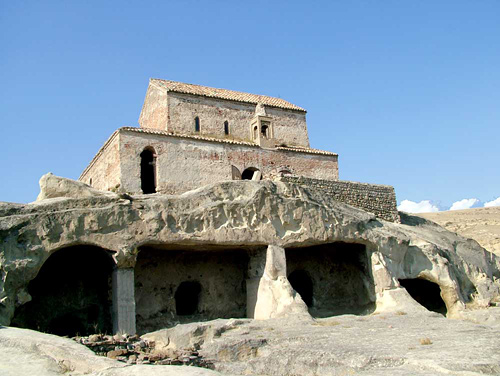 The church devoted to St. George
The church devoted to St. George
I still meet with many spiritual people, and receive very much. It is a special blessing to learn from them, and I am very grateful to the Lord for this.
– Vladyka, what events in your life are bound up with Archimandrite Vitaly?
– I met Fr. Vitaly after I had met Fr. John (Krestiankin) and Fr. Nicholas Gurianov. I had the opportunity to converse longer with Fr. Vitaly. These were spiritual talks. I would not want to talk here about those things that have been published and about which many have already read, or about what he said to me personally, or to someone else, or what he did. I would like to tell about his amazing love and humility. He was ready to give his life for another. If he had to do it in a moment, he would do it—without a thought, he would give his life for the salvation of a human soul, with great humility and dedication to God’s will. This is what I remember most of all about Fr. Vitaly. He loved Georgia very much. He always said to his spiritual children, “Come to Georgia! It is a holy land.” He especially loved monastics; he loved them with particular warmth and tenderness.
– Where did you take the tonsure, Vladyka?
– I was tonsured in the monastery of St. Anthony of Martkopi; I was also a novice and monk there. Then I was transferred to Western Georgia, to Zugdidi. There is an ancient monastery there in the village of Kortskheli. This monastery was at one time the metochion of the Holy Cross Georgian monastery in Jerusalem. The years I spent there were very difficult. The country was recovering from civil war, especially western Georgia. There was an acute need of everything: goods, and medicines. People were also under heavy impressions from everything that was happening. But those were also very interesting years, and gave me very much personally, in the spiritual sense. I think that this applies also to the brothers with whom I prayed and labored.
– What obediences[3] did you have in those monasteries?
– I performed those obediences that I was blessed to do... You know, the thoughts that I had when I left for the monastery were that I should have humility. This thought was as if central in me, and the obediences I was given were not difficult for me (I am not talking about the physical aspect) in the spiritual and moral sense. I always accepted this as a natural situation for a monk—his obligation. It is dedication to God’s will through dedication to the will of the abbot or spiritual father. I performed obediences in the monastery stables, I was the cook, I worked in the church, and on all the other obediences there were in the monastery: housecleaning, gardening, cutting wood—whatever I was blessed to do. I also read lectures, out of obedience, on the lives of the saints, and was a reader.
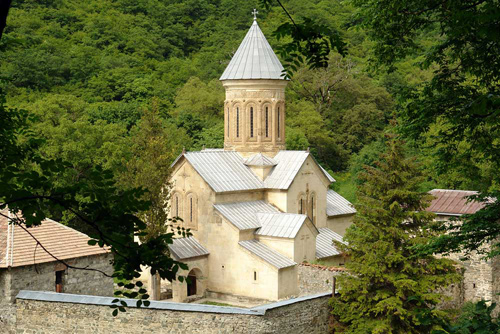 Kvatahevi.
Kvatahevi.
– For me, monasticism is the shortest path to true humanity, to the condition of a true human being, the state of Adam, through Christ, and through personal struggle. I see in Christianity a true return to humanity, while monasticism is the shortest path to this.
– When did you become a priest, and where did you serve?
– I was ordained by Patriarch Ilya in 1996 and sent from the monastery to serve in the Church of the Holy Archangels in Tbilisi. This was a church in the military academy. Later I was sent to St. David of Garedja Lavra. The abbot had left the monastery, and His Holiness blessed me to bear the obedience of abbot in the Lavra of St. David of Garedja.
–When you were abbot of St. David of Garedja Monastery, what did you consider the most important thing?
– I consider that the most important task of an abbot is to create an atmosphere in the monastery that would support spiritual labor in every way. This atmosphere, of course, comes together from several components: the monastery order, which should be organized; from the obligation to serve the Divine Services; and the obediences that the monks perform. The abbot should be a loving father to all the brothers. He should take care for every aspect of the brothers’ lives: what brings them joy, what grieves them. He should take care for their spiritual and physical protection, and that they would develop spiritually. The abbot should do everything to support the brothers’ spiritual development. Obedience should be accepted as a virtue which a monk should attain. A monastery is not the place for “work therapy.” Everything should be delegated wisely. A monk is not a tractor driver, or a farmer, or a shepherd. He is someone who should always have his thoughts and actions directed toward prayer and labor for God. Throughout the performance of his obedience he should never forget his yearning for God. No one should ever prevent this yearning. No obedience should lead him away from this. If, for example, the abbot sees that a monk’s thoughts are led away from God through some obedience, then of course it is best if he does not fulfill that obedience, so that it might not harm the monk’s spiritual state.
– Since 1998, you have been a hierarch of the Georgian Orthodox Church. What do you think, Vladyka—is the Church growing? What is being done to enable its growth?
– Yes, in 1998 the Synod of the Georgian Orthodox Apostolic Church appointed me to the cathedra of the Sagaredjo and Gurdjaani diocese. This was the decision and blessing of His Holiness the Patriarch and the Holy Synod. Precisely because the Church is growing, and people are needed to help it grow, I became a bishop. I was the twenty-seventh hierarch of the Georgian Church. Why do I mention this? In 1995, during a great Council of the Georgian Church, old dioceses were restored and new ones were created, and they then numbered twenty-seven. From 1995 to 1998, these dioceses where established and their diocesan cathedras were brought in order. I was the last of the hierarchs who were appointed to the newly-founded cathedras. I now recognize this as a great trust in and responsibility placed upon me. This was the blessing of the Holy Church, the need to build up the Church, and renew Church life.
As you know, Our Church, like all the other Orthodox Churches including the Church in Russia and other countries where there was a communist regime, was under great oppression and control by the authorities. The Georgian Church, just as the Russian and Serbian Churches, bore great difficulties.
Of course, the process of rebirth continues even now. We cannot say that our Church has finally been reborn. It is in the process of rebirth. A great example to all of us is our Holy Patriarch Ilya, who has been our Patriarch for thirty-two years now. The whole process of rebirth and restoration is bound up with him, although His Holiness always speaks about this very modestly, pointing out that this is the will of God. But the will of God was fulfilled through him, by his blessing.
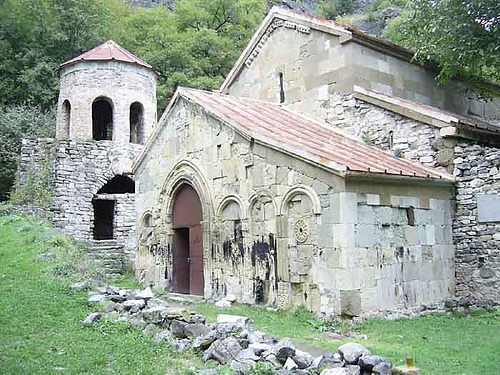 Rkoni
Rkoni
– Now I am the ruling bishop of Samtavisi and Gori. This diocese was created at the Council of 1995, and it consists of two ancient cathedras. The Samtavissi cathedra is one of the twelve most ancient cathedras, which had been founded during the reign of the holy King Vakhtang Gorgasali in the sixth century. The Gori cathedra also has a long history. There are very deep Christian roots in the Gori region, just as in all of Georgia. The most ancient church in this territory dates from the sixth century. Patriarch Kyrion, Patriarch Leonid, Holy Hierarch Alexander, and Patriarch Ephraim were born in this diocese. One of the oldest educational institutions in Georgia, the theological school, was located in Gori. Now it is restored and functions as a theological school for children.
– Is that the educational institution where Stalin studied?
– Yes. Many other societal figures and outstanding Georgians studied there: Jacob Gogebashvili, Niko Lomouri, Niko Ketskhoveli, Lado Ketskhoveli.
– When was this school restored?
– It was restored in 2006.
– What monasteries are on the territory of your diocese?
– There are several historical monasteries in our diocese: Kvatakhevi Monastery, the monastery of St. Ateni Sioni, the monastery in Rkoni, the Monastery of St. George (Gorijvari), Samtavisi Monastery, where there are the relics of St. Isidore of Samtavisi, and Tetrakhevi Monastery. According to certain historical information, the relics of St. Thaddeus of Stepantsminda are there.
– Which churches and monasteries are now being restored?
– At the present moment there are sixty active churches in our diocese, two active men’s monasteries, and one monastery for women. Three monasteries are being restored. Archeological and restoration work is now going on there, but monastic life is not yet re-instituted. However, we hope that with time, when the main work will be finished, brothers or sisters will settle there.
– Your life has always been connected with volatile events. Thus it was during your student years in Sukhumi. Later you were transferred to the cathedra of Gori, and life is not peaceful there either. During the bombing of Gori, you did not leave the city, but prayed in the church together with the parishioners and gave an example to all the Orthodox of faith in the power of prayer to change the situation, and bring peace. What can you say about this?
– Unfortunately, I have had to live through two wars that have taken place in Georgia, not including the civil war. Probably all of us had to be in volatile areas, and not only me. These were days of great trial for the entire population of our country, our diocese, and our city. During the bombing of Gori, there were daily Liturgies in the Cathedral. I myself celebrated, and there were moments during Communion when I would tense up inside, waiting for the church’s dome to crumble down, or for a shock wave from an explosion that would so shake the church that I would fall down with the chalice in my hands. But the Lord gave me strength. I was not alone—the clergy and monastics of our city were also with me; the parishioners came every day, prayed, received Communion, and begged the Lord to stop the bloodshed and grant peace. Unfortunately, there were victims of the air raids. Trials always show what is in a person—his faith, his worth as a human being. This was a trial of our faith, our dedication to God, to our country, and to mankind. We did not do anything out of the ordinary, we cannot say that we are heroes; we did what was our duty to do. Glory be to God for all things. I thank God that He gave us the strength to fulfill our sacred obligation.
– During the war, you walked the streets to calm the bereft, comfort and commune the wounded and dying. Were you afraid that your life could be in danger?
– It is impossible not to be afraid, because we are all human, and no one likes pain. No one wants to die in an uncertain state. We were obligated to take care of those who were left without food or shelter. We helped in whatever way we could. The Lord gave us strength to do this. The only place where people could receive food was the church. There was a cafeteria set up inside. Every day we distributed up to 2,000 loaves of bread that the parishioners baked. This was important for those who labored—they showed love and compassion for their neighbors. This was all given out to those who remained in the city. We sprinkled Holy Water around the whole city. We strengthened and supported those in need. We gave them hope that it would soon end, and it would be peaceful once more. This was our obligation, and there is nothing special in it; we did not do anything that we were not obligated to do.
– Vladyka, as you see it, how can we make peace with our brothers, the Ossetians?
– I think that the first step toward peace should be bound up with the truth, because without the truth, there is no meaning to existence. Truth is man’s natural desire, and humanity cannot live without truth. Of course, the truth should be spoken on all sides, because each should accept the responsibility for the guilt that lies with himself. And we should look forward without fail—we should look toward our future. We are one country. We are people who have lived side-by-side with each other for centuries, and will continue to live together. Only, the process of drawing boundaries should not be long and drawn out; this would not be good for anyone. We should definitely strive to find a common language and speak directly to each other, no matter what—Georgians, Ossetians, and Abkhazis. We should speak honestly, openly, based upon God’s commandments given to the whole world; they are the very foundation of peace, joy, and mankind’s future.
We must definitely forgive each other. And we should definitely, together, bring our repentance to God.
– You were recently awarded the highest medal of the Georgian Republic: the medal of King Vakhtang Gorgasala. What responsibility does this award bring?
– I can’t say that this award gives me some new responsibility that I did not have before. Does a medal determine one’s relationship? Does a man become more courageous or responsible after receiving it? This award is not only mine, but it belongs also to all those who bore those difficulties with us. This award is not only for clergy and monastics, but for all the citizens of Gori who experienced the trials and tribulations; because it is hard to see people dying, buildings crumbling. It is hard to know that you could die any day.
– How must we live in order not to fall into temptation?
– In order not to fall into temptation? I think that falling into sin is very human. The Lord knows that we are weak. The Lord is very good and merciful to us. He knows all our weaknesses, He knows all our infirmities. He does not expect us who are sinners today to become saints tomorrow. He knows that this is impossible. But He also knows that together with Him, with Him next to us, this sanctity will be given to us by Him, by God Himself. Sanctity is not a reward. You can’t just behave well, and then get sanctity for it. It will be granted as an acquisition, as something the Lord has in store for you, and you only need to come to it. But in order to come to it, you always need to strive for it. It is very important to have a sense of God, a sense of the living God. The Lord is not an abstract understanding. He is not located somewhere up there in the heavens. He is everywhere. The Lord waits for a man—He waits for him in all his conditions; if only man would strive for Him.
Archbishop
Andrei (Gvazava) was interviewed by Shio
Otarashvili,
a student of the Sretensky Theological Seminary.
Translated by Nun Cornelia (Rees)
[1] New Athos Monastery was begun in 1874 by Russian monks from the Rossikon (St. Panteleimon Monastery) on Mt. Athos at the outbreak of the Russo-Turkish war. —Trans.
[2] Nicholas Roerich (1874–1947) A Russian painter and thinker whose eclectic Eastern religious thought become popular again in Russian in the 1980’s. —Trans.
[3] A task given to a monastic in the monastery is called and “obedience.” —Trans.
